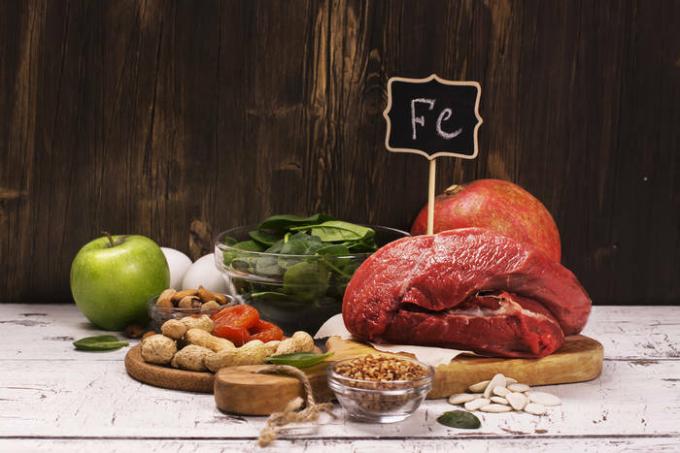Lethargy, pallor, shortness of breath, and brittle nails can be signs of anemia. How to recognize a hemoglobin deficiency and how to raise its level at home
Hemoglobin is the most important element in the blood, without which even breathing would be useless. The function of this complex protein is to carry oxygen molecules from the lungs to all internal organs, tissues and cells. Hemoglobin carries carbon dioxide back to the lungs. So it is thanks to hemoglobin that we get all the benefits of inhaling and exhaling. Lack of hemoglobin in the blood leads to oxygen starvation. That's just not always this condition can be recognized in the early stages. Most often, we explain the hemoglobin deficiency by chronic fatigue and spring vitamin deficiency.
Signs of a lack of hemoglobin in the blood

With a hemoglobin deficiency, you constantly want to sleep / istockphoto.com
In fact, general weakness, chronic lethargy and a constant desire to sleep are the first signs of a lack of hemoglobin. When there is too little of this protein in the blood, all internal organs in one way or another receive less oxygen. As a result, our brains work worse, and we constantly experience a feeling of mild lethargy. Even the smallest physical activity causes a heartbeat, and we literally fall off our feet. In addition to general body fatigue, signs
lack of hemoglobin may be:- Constant desire to sleep. You are critically lacking those hours of sleep that previously brought you to a state of alertness. In the morning, there is no strength to get out of bed, and during the day, the desire to take a nap haunts
- Dizziness and migraine. You have headaches that are difficult to relieve with pain medications, and you often have mild dizziness throughout the day
- Low blood pressure. If you keep track of your blood pressure, you will notice that you have lowered it all the time. At the same time, life hacks like a cup of coffee do not help bring it back to your working norm.
- Pallor of the skin. You are often told that you look paler than usual. In this case, the skin tone can give off a slight blueness. This is especially noticeable on the gums - instead of a rich pink color, they became whitish due to pallor
- Dry skin and split nails. In addition to pallor, your skin signals a lack of hemoglobin by dehydration. You always want to moisturize your face and hands with cream. Nails for no apparent reason begin to flake and break
- Shortness of breath and palpitations. Against the background of a lack of hemoglobin, shortness of breath occurs from the most commonplace things (brisk walking, climbing stairs). Having caught up with the minibus departing from the stop, you feel as if you have just passed a long-distance race.
Causes of hemoglobin deficiency in the body

A blood test will show how low your hemoglobin level is / istockphoto.com
Each of the signs of a lack of hemoglobin in itself is not obvious, and can speak of something completely different. For example, the reason for chronic fatigue lies in the really increased level of workload in recent years. Desire to sleep - in regular lack of sleep (less than 8 hours a day). And brittle nails and hair - in a lack of B vitamins. However, the combination of all these signals should be a bell that you need to go to the doctor. Against the background of your inaction, the level of hemoglobin in the blood will continue to decrease. And this is fraught with such a condition as iron deficiency anemia.
The doctor will prescribe a detailed blood test for you. If he confirms a lack of hemoglobin, for proper treatment it will be necessary to find the cause of this condition. The reason may well be obvious. For example, you are dieting and restricting yourself in many foods. Also, a low level of hemoglobin is characteristic during pregnancy, after a large blood loss (due to injury or, for example, long and heavy periods), after suffering colds or as a result of the fact that you are stick to Great Lent and completely gave up meat.
However, sometimes a deficiency of this protein in the blood can become a marker of much more serious diseases of the body.
How to increase hemoglobin at home
If your doctor does not find you have any serious problems, you can easily adjust the hemoglobin level in your blood yourself. This is best done with food. A properly selected diet will allow you to return the amount of this protein to normal in a month, and it certainly will not harm, as some vitamins and dietary supplements can do. When shaping your diet, pay attention to:
Iron rich foods

Eat iron-rich foods to raise hemoglobin / istockphoto.com
Hemoglobin is a complex protein that consists directly of a protein complex (globin) and iron components (heme). Therefore, a lack of iron in the diet often slows down the synthesis of hemoglobin by the body. To regulate this process, eat iron-rich foods:
- red meat
- liver and offal
- legumes (beans, lentils)
- seeds, nuts, dried fruits
Folic acid foods

Folic acid foods are essential for hemoglobin synthesis / istockphoto.com
For the synthesis of hemoglobin, our body needs vitamin B9 or folic acid. A persistent lack of this trace element will be the first step towards iron deficiency anemia. Make sure that the following foods are always in the diet:
- green leafy vegetables (kale, lettuce, spinach)
- chicken or veal liver
- legumes (chickpeas, peas, lentils)
- asparagus and broccoli
- linseed oil
Vitamin C rich foods

Vitamin C promotes better iron absorption / istockphoto.com
It is not enough just to saturate the body with iron, you need to make sure that this trace element is also properly assimilated. Vitamin C helps to extract as much iron as possible from food. In order to get it, try to consume as many of these foods as possible:
- citrus fruits (oranges, grapefruit, tangerines, pamelo)
- berries (strawberries, black currants, blackberries)
- leafy greens (spinach, lettuce, sorrel)
Foods high in calcium

Eat less calcium-rich foods for hemoglobin deficiency / istockphoto.com
With these products, you need to do exactly the opposite: with a deficiency of hemoglobin, their number in your menu needs to be cut. The fact is that excess calcium in the body interferes with the absorption of iron. Therefore, eat these foods with caution:
- milk and dairy products (cottage cheese, sour cream, kefir, yogrut)
- hard cheeses
- sardine, small canned fish (which we eat with the bones)
- soy and soy products
Vitamin complexes with iron

Iron supplements should only be taken as directed by a physician / istockphoto.com
Supplements that enrich the body with iron are not advisable to take without consulting a doctor. Firstly, with the active use of this trace element, you can earn an excess of it. This is a rather unpleasant condition, which is very difficult to correct. The fact is that the body cannot remove excess iron on its own, this only happens when blood is lost. Also keep in mind that many complexes contain other vitamins along with iron. For example, iron supplements often contain vitamin C and A. Overloading the body with these vitamins is a dubious pleasure, fraught with hair loss, aching bones, headaches and vision problems.
You will also be interested to read:
The main signs of anemia that cannot be ignored
The truth about hidden iron deficiency
Iron deficiency: what signs will indicate your problem



